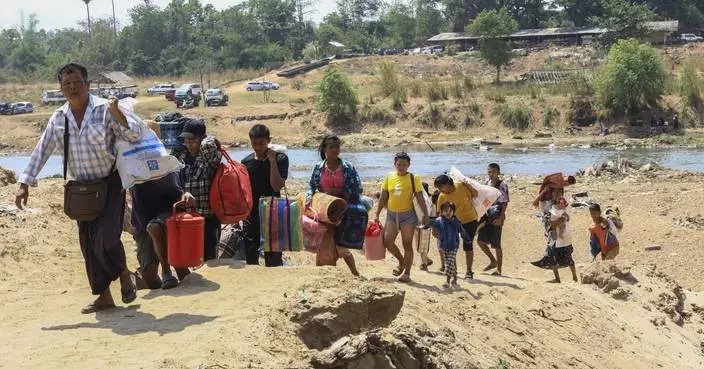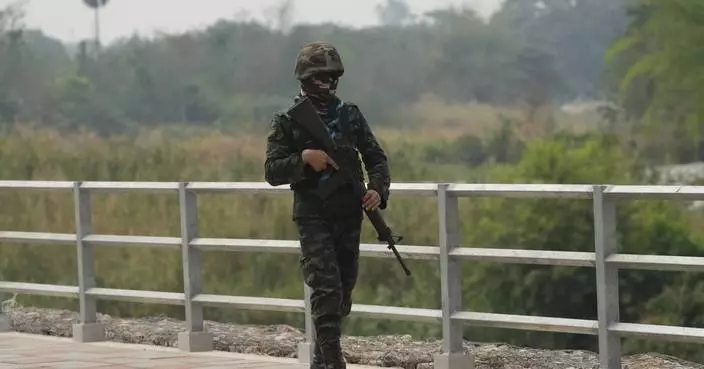Hundreds of hard-line Buddhists protested Sunday to urge Myanmar's government not to repatriate the nearly 600,000 minority Rohingya Muslims who have fled to Bangladesh since late August to escape violence in Myanmar's Rakhine state.
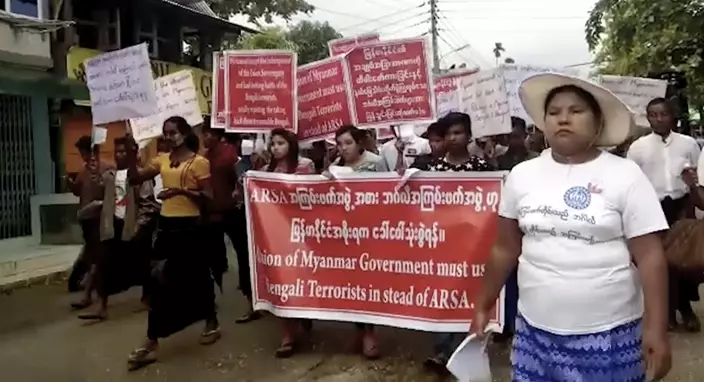
In this image made from video, protesters march in Sittwe, Myanmar, on Sunday, Oct. 22, 2017. Hundreds of hard-line Buddhists protested Sunday to urge Myanmar's government not to repatriate the nearly 600,000 minority Rohingya Muslims who have fled to Bangladesh since late August to escape violence in Myanmar's Rakhine State. (AP Photo)
The protest took place in Sittwe, the state capital, where many Rohingya lived before an outbreak of inter-communal violence in 2012 forced them to flee their homes.
Aung Htay, a protest organizer, said any citizens would be welcome in the state. "But if these people don't have the right to be citizens ... the government's plan for a conflict-free zone will never be implemented," he said.
Myanmar doesn't recognize Rohingya as an ethnic group, instead insisting they are Bengali migrants from Bangladesh living illegally in the country. Rohingya are excluded from the official 135 ethnic groups in the country and denied citizenship.
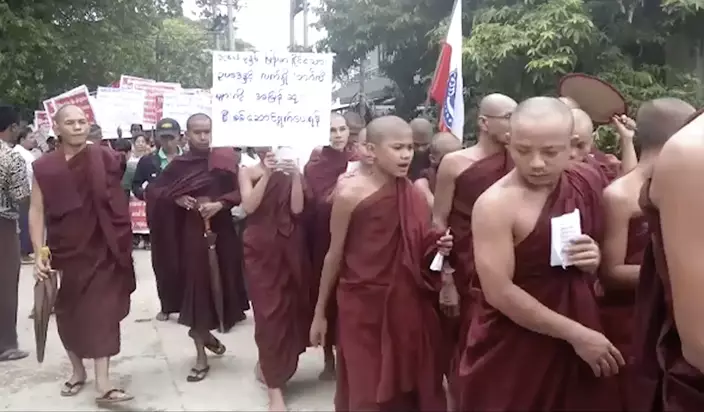
In this image made from video, protesters march in Sittwe, Myanmar, on Sunday, Oct. 22, 2017. Hundreds of hard-line Buddhists protested Sunday to urge Myanmar's government not to repatriate the nearly 600,000 minority Rohingya Muslims who have fled to Bangladesh since late August to escape violence in Myanmar's Rakhine State. (AP Photo)
More than 580,000 Rohingya from northern Rakhine have fled to Bangladesh since Aug. 25, when Myanmar security forces began a scorched-earth campaign against Rohingya villages. Myanmar's government has said it was responding to attacks by Muslim insurgents, but the United Nations and others have said the response was disproportionate.
Myanmar de facto leader Aung San Suu Kyi's government said earlier this month that it was willing to take back Rohingya refugees who fled to southeastern Bangladesh. The government has agreed to form a joint working group to start the repatriation process.
On Sunday, protesters, including some Buddhist monks, demanded that the government not take back the refugees.
"The organizers of the protest applied to get permission for a thousand people to participate in the protest, but only a few hundred showed up," said Soe Tint Swe, a local official.
Meanwhile, thousands of people gathered Sunday in Myanmar's capital, Naypyidaw, to show support for Suu Kyi and the government's handling of the Rohingya crisis.
Colorful crowds of people, some wearing T-shirts with Suu Kyi's photo and some holding photo frames of Suu Kyi and her National League for Democracy party flag, took part in the rally.
The global image of Suu Kyi, a Nobel Peace laureate, has been damaged by the violence in Rakhine, which has sparked Asia's largest refugee crisis in decades.
Allergy season can bring misery to tens of millions of Americans each year.
Tree, grass, and other pollens can cause runny noses, itchy eyes, coughing and sneezing.
Where you live and what you're allergic to can make a big difference in how bad your allergies are, but there are many things you can do to feel better.
Here are some tips from experts to keep allergies at bay — maybe even enough to allow you to enjoy the outdoors.
There are three main types of pollen. Earlier in the spring, tree pollen is the main culprit. After that grasses pollinate, followed by weeds in the late summer and early fall.
Some of the most common tree pollens that cause allergies include birch, cedar, cottonwood, maple, elm, oak and walnut, according to the Asthma and Allergy Foundation of America. Grasses that cause symptoms include Bermuda, Johnson, rye and Kentucky bluegrass.
The best and first step to controlling allergies is avoiding exposure. That’s easier said than done when it's nice out.
Start with keeping your windows closed at home and in the car, avoiding going out when pollen counts are highest and changing clothes when you get home. The same masks that got us through the pandemic can protect you from allergies — though they won't help with eye symptoms.
Pollen trackers can help with planning. The American Academy of Allergy Asthma and Immunology tracks levels through a network of counting stations across the U.S. Counts are available at its website and via email.
You can't fight an enemy you don't know.
Since many Americans are allergic to several things at once, the first thing to figure out is what specifically you’re allergic to, said Dr. Nana Mireku, an allergist in the Dallas-Fort Worth area.
Over-the-counter nasal sprays can help relieve symptoms, but they take a while to kick in, so it’s best to start them in early in the season, said Dr. Rachna Shah, an allergist and director of the Loyola Medicine Allergy Count.
Antihistamines are another option. Shah said she’s seen some patients benefit from switching to a similar brand if one stops working, but said that there isn’t much broader data to back the recommendation.
For young children and people who have to take many different allergy medications, immunotherapies in the form of shots and oral drops can help desensitize the immune system to allergens, treating symptoms at their root.
The Asthma and Allergy Foundation of America issues an annual ranking of the most challenging cities to live in if you have allergies, based on over-the-counter medicine use, pollen counts and the number of available allergy specialists. This year, the top five were Wichita, Kansas; Virginia Beach, Virginia; Greenville, South Carolina; Dallas; and Oklahoma City.
If you've been thinking it started earlier and seems longer this year, you're on to something.
Shah usually starts looking at pollen counts in the Chicago area in April. But this year, she peeked at her data in mid-February, and tree pollen was already at a “moderate” level.
“This season has been so nuts,” she said. “Granted, it was a pretty mild winter, but I didn’t expect it to be so early.”
Shah said she believes this season will be longer than other years, assuming the weather remains warm.
Experts say climate change has led to longer and more intense allergy seasons.
The Associated Press Health and Science Department receives support from the Robert Wood Johnson Foundation. The AP is solely responsible for all content.
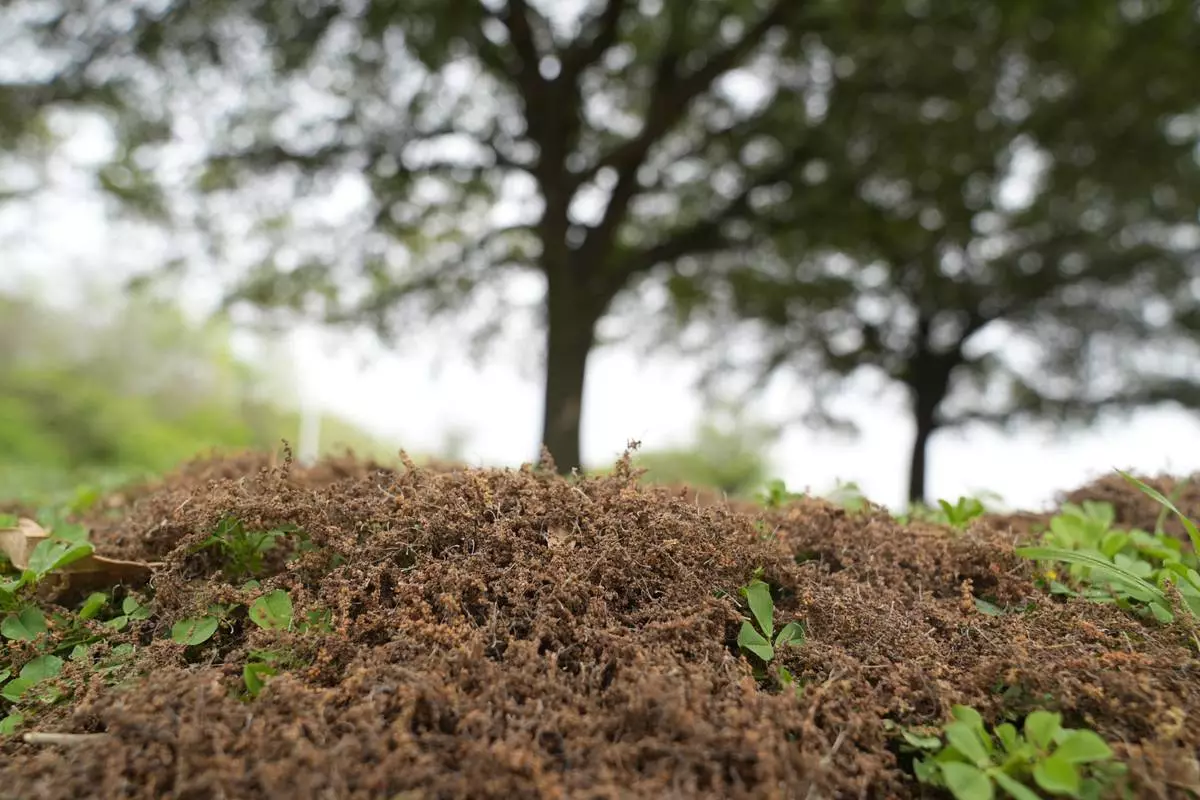
FILE - Tree pollen pods lay in a pile at a park in the Dallas suburb of Richardson, Texas, Thursday, March 21, 2024. The Asthma and Allergy Foundation of America issues an annual ranking of the most challenging cities to live in if you have allergies, based on over-the-counter medicine use, pollen counts and the number of available allergy specialists. In 2024, the top five were Wichita, Kansas; Virginia Beach, Virginia; Greenville, South Carolina; Dallas; and Oklahoma City. (AP Photo/LM Otero, File)
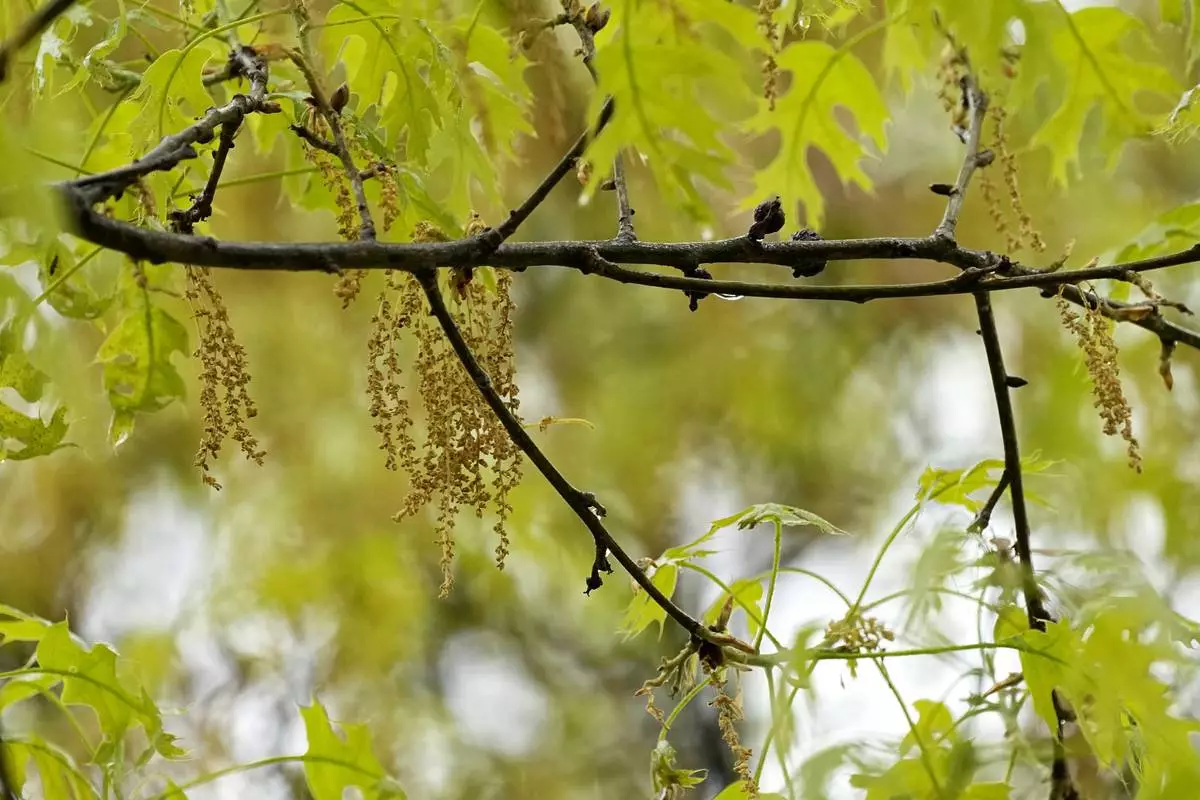
FILE - An oak tree with new leaf growth also shows pollen and a drop of water hanging among the branches at a park in Richardson, Texas, Thursday, March 21, 2024. There are three main types of pollen. Earlier in the spring, tree pollen is the main culprit. After that grasses pollinate, followed by weeds in the late summer and early fall. (AP Photo/Tony Gutierrez, File)








